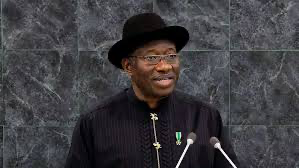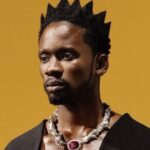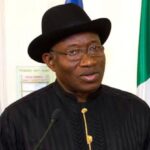Former President Dr. Goodluck Jonathan is making significant strides in his quest to contest the 2027 presidential election, undeterred by public dissent from his wife, Patience Jonathan.
At a recent event in Abuja, where she was honored as the Women Icon Leader of the Year, Mrs. Jonathan voiced her concerns about the pressures of public office, stating, “The distress of Nigeria is so much that if God manages to bring you out of it, you should glorify Him. Why do you want to go back there? I need peace. My peace is enough.” She expressed her support for President Bola Tinubu’s administration, even committing to campaign for his re-election.
Despite this, sources close to Jonathan reveal that he is intensifying efforts to secure the Peoples Democratic Party (PDP) nomination. To mitigate potential interference from pro-government factions, his supporters have held clandestine meetings abroad, focusing on solidifying his base within the PDP and addressing the challenges posed by Nyesom Wike, the Minister of the Federal Capital Territory. Wike recently advised Jonathan to preserve his legacy and not pursue another presidential run, labeling advocates for his candidacy as hypocritical.
Jonathan’s camp perceives Wike’s remarks as a serious threat. A source indicated that discussions have centered on strategies to neutralize Wike’s influence, emphasizing the need to ensure a seamless path to the party’s nomination. Key to this strategy is the support of influential figures like Bala Mohammed, the Governor of Bauchi State, to maintain party unity and prevent defections that could weaken the PDP’s standing in the South-South region, a crucial stronghold for Jonathan.
In a proactive move, Jonathan’s allies successfully dissuaded Bayelsa State Governor Douye Diri from defecting to the All Progressives Congress (APC), a potential blow to the PDP’s stability in Jonathan’s home region. When questioned about the implications of his wife’s public disapproval, a source brushed it off as inconsequential, recalling that Patience had previously opposed his vice-presidential nomination yet could not prevent his ascension.
Furthermore, Jonathan’s camp has countered claims about his eligibility to contest again, referencing a court ruling affirming his constitutional right to seek the presidency for a third time. As the political landscape evolves, Jonathan’s ambition to reclaim the presidency could reshape the dynamics within the PDP and influence the broader electoral landscape in Nigeria.
In summary, while Goodluck Jonathan faces internal and external challenges, his determination to pursue the 2027 presidential election underscores a complex interplay of personal ambition, party loyalty, and the quest for political legacy in a rapidly changing Nigeria.


